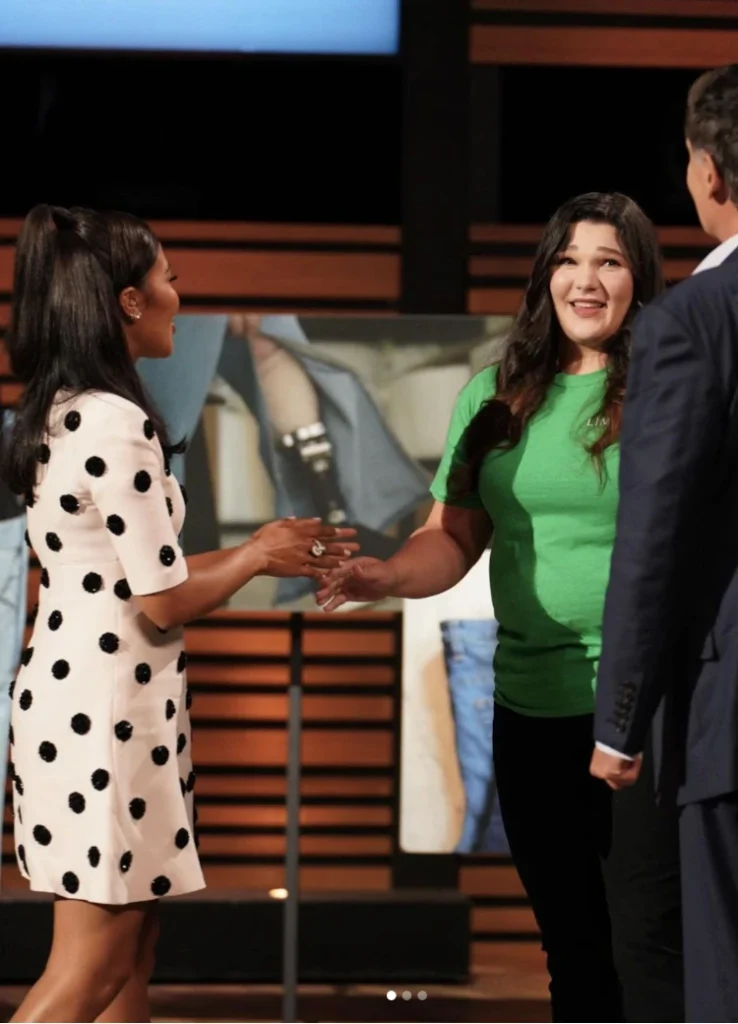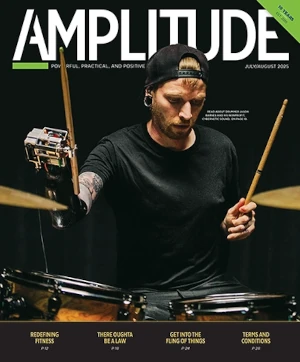
Step off, TS Eliot. For Erica Cole, April is anything but the cruelest month.
It was in April last year that Cole persuaded not just one, but two of the canny capitalists on ABC’s Shark Tank to back her inclusive jeans startup, No Limbits, to the tune of $100K. And it was two Aprils ago that she raked in more than $12,000 on Kickstarter to fund No Limbits’ proof-of-concept production run.
This Saturday marks the start of another April—and, right on time (a day early, actually), Cole will be back on Shark Tank to let the panel and all the rest of us know how business is going. The episode will air Friday at 8 pm Eastern on ABC.
We’re not giving away any spoilers by reporting that business is going really, really well. In January No Limbits announced it had raised $1.4 million in seed capital, above and beyond the $100,000 stake put in by sharks Emma Grede and Mark Cuban. Earlier this month the company launched the Unlimbited Pant, a new line that includes non-denim options. And there are a bunch more announcements in the offing, related to a major expansion of No Limbits’ wardrobe.
We caught up with Cole on the phone yesterday to learn as much as she’s allowed to share before the episode airs. The conversation is edited for clarity and length. Visit No Limbits at no-limbits.com.
Before we talk about the new Shark Tank episode: What’s at the top of your task list at No Limbits these days?
The main focus has been building out our team and building out our product assortment. We have about 14 new products that we’re launching this week, before Shark Tank airs. Some of them will be available for pre-order, and some are available right away. We’re launching our wheelchair pants on Friday, and that’s exciting for us, because it’s taken over a year to develop them.
Did you say 14 new products in one week? This week?
It’ll be like a whole new brand by Friday. We’re super excited about that, but to be honest I’m a little stressed. But it’s a good stress.
I don’t want to preempt any announcements that you’re planning to make, but is there anything you can share about the new products that would be of particular interest to amputee customers?
I think the wheelchair pants are going to be super interesting for amputees who use wheelchairs. We’ve really designed them for the seated body. Historically, clothing has always been designed on the standing body, right? We actually created our own special fit for people who are seated the majority of the time. They have side zips, which makes it easier to get them on or off while you’re sitting or lying down. And they’ve got thigh pockets also, because when you’re seated, obviously, those back pockets aren’t super useful. We just took them off, because they can even cause bedsores, and we added thigh pockets. Your phone, wallet, keys, and all of that fits into a thigh pocket, and you can zip it up and make sure it’s really secure.
The other thing I’m focused on is the growth of our team. We now have five full-time employees, plus four part-time, and the majority of us have a disability of some kind. Our new designer is a bilateral upper-limb amputee named Bethany Marvel. She was an occupational therapist for 10 years before joining us, so she designs from both her own personal perspective of limb difference, and from the occupational therapy perspective of how these products can be safely and effectively used by our customers. She’s just amazing. She designed a new blouse for us that’s designed to be worn without a bra, because we’re learning that for people with an upper-limb difference, a bra can be really difficult to get on. So she designed a shirt that’s meant to be worn without a bra. It’s sensory friendly also, which is really cool. We’re very excited about that.
I’m not all that familiar with Shark Tank. Is it common for contestants to come back onto the show to give a progress report, like you’re doing?
I think they do one update every episode from a team that has gotten a deal with a shark. People are always curious about how startups are doing, so they invite people back after a certain amount of time to show how that relationship [with the shark] has helped grow the business. We were told that Mark [Cuban] actually recommended us for the update, which is really nice to know. It’s a sign that he thinks we’re doing interesting things and so our update might be interesting to viewers.
So how have those relationships helped you? You actually have two sharks advising you, Mark Cuban and Emma Grede.
It’s really a dream-team combination of experience that they bring to the table. Emma’s just a powerhouse in the apparel world, and especially in denim, which is one of the hardest products to develop. So her experience in that has been really helpful. And she’s so good in marketing. She’ll look at our line plans and tell us, “You should change this color to that, and you should change that hem, and they’ll sell better.” And she has so much data behind everything that she does, and she’s been so generous with giving us access to her metrics and to her team. I actually went out to Los Angeles last fall and got to meet with her chief financial officer, chief revenue officer, director of product—all of these people. I feel like we gained a year in knowledge just from that.
Mark is great because he has visibility into a lot of startups. I’ve been able to ask him about macro trends and business strategy. I talk to him less on the product side, but more on subjects like: What’s our fundraising strategy? What’s our growth trajectory? How are we thinking about this path to profitability? All of that’s been really helpful, too.
Do you have regularly scheduled meetings with them or whatever? Help me understand that relationship.
I send Mark a monthly update, and he responds to every single one. Sometimes we’ll have a back-and-forth conversation over email. I actually communicate with him in that way more than I thought I would. Emma and I have been getting on a call about once a month, and every once in a while I’ll have a question for her CFO or someone else on her team and we’ll hop on a call. That’s so valuable, because their company is where we want to be. So being able to follow in their footsteps, and knowing what they went through to make a decision and how it turned out for them, is so valuable. And apparel is different than a lot of other businesses. There are different inventory questions and warehousing questions than a lot of other startups have. I can’t emphasize enough how much time and heartache they have saved us.
You’ve gone from being a one-person company where you made every pair of jeans on your own sewing machine, to managing a team and a company. What’s been rewarding about that? And what has been difficult?
Building the team have been incredibly rewarding. Every day I’m thankful for the people who have chosen to work with No Limbits. The stars aligned again and again. There’s this gravity around the adaptive apparel space that pulls very passionate people together. So building this team of people who not only are extremely passionate about adaptive clothing, but also extremely skilled in their own areas of expertise and really enjoyable to work with—that’s absolutely the best part of the job for me.
I guess the challenge that goes along with that is that shifting to the business management side comes with a pretty intense learning curve. Most of the time I enjoy that, but sometimes it’s uncomfortable. I am in this mindset that says if I’m getting comfortable. I’m not pushing myself hard enough. It’s not that I want to fit into an entrepreneurial hustle culture, but there’s a growth zone that is outside the comfort zone. I’m learning to navigate that.
But I also remind myself that we started an apparel company in the middle of the supply-chain crisis, and we survived. So hopefully that means we have a level of stability and a secure foundation. But it’s always going to be a little stressful, a little nerve-wracking. The good news is that everybody on our team has a really good understanding of the big picture, which I’m really grateful for.




